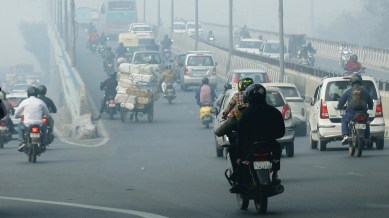Stay updated with the latest - Click here to follow us on Instagram
WFH, odd-even: Highest pollution curbs in place in Delhi, no measures on ground
The Act that constituted the CAQM for the NCR was passed in 2021. While it takes decisions on imposing stages of GRAP in the NCR, the steps are to be implemented by state governments.

Letting public, municipal and private offices work on 50% strength and the rest to work from home; closure of colleges and “non-emergency commercial activities,”; allowing vehicles to run on odd-even basis — it has been 11 days since Stage IV of the Graded Response Action Plan (GRAP) was imposed, but these measures are yet to be enforced.
This, even as Delhi’s air quality deteriorated further on Thursday — the AQI was 440 (‘severe’) at 10 pm.
monthly limit of free stories.
with an Express account.
This is also the longest stretch for which the most extreme restrictions under the plan have been suggested, at least from 2021 onwards. Last year, Stage IV — which comes into force when AQI levels are over 450 or the ‘severe plus’ category — was invoked by the Commission for Air Quality Management (CAQM) on November 3 and revoked three days later. In 2021, it was invoked on November 3 and revoked on November 7.
The Act that constituted the CAQM for the NCR was passed in 2021. While it takes decisions on imposing stages of GRAP in the NCR, the steps are to be implemented by state governments.
While the odd-even scheme has not been implemented in the city after an attempt in 2019, work-from-home for 50% of Delhi government staff was announced in November last year.
The Delhi government had earlier announced that the odd-even scheme would kick in from November 13 to 20, only to defer it after the Supreme Court had referred to it as “optics.”
When contacted for a comment, the office of Environment Minister Gopal Rai said measures such as the odd-even scheme and 50% work from home in private and government offices are under consideration for implementation subject to the AQI reaching the ‘severe plus’ (more than 450) category.
The transport sector, meanwhile, continues to remain a large contributor to PM 2.5 levels in the city, going by data from IIT-Kanpur’s real-time source apportionment study. At 38%, it was the single largest contributor to PM 2.5 levels in the city on Wednesday, followed by 30% from secondary aerosols, and 23% from biomass burning.
Anumita Roychowdhury, Executive Director, Research and Advocacy, Centre for Science and Environment (CSE), said, “Evidently, restrictions are applied keeping in mind public reaction. On some measures, there is hesitation to implement action more aggressively. Some restrictions are in place, but keep in mind that at this moment, vehicles are the major contributor to pollution, so when you do have a smog episode, reducing the sheer volume of vehicles on the road is critical. That needs to be addressed during a severe smog episode, and they would have to find ways of dealing with it and implement measures that have already been included.”
Meanwhile, Rai Thursday said a six-member special task force, including officials of the environment department, Traffic Police, MCD and PWD, has been constituted to implement GRAP-related restrictions.
Rai said 16,689 BS III petrol and BS IV diesel vehicles have been fined Rs 20,000 so far, and 6,046 trucks have been turned back from the borders. Challans have also been issued to 921 construction sites for violating norms, with construction and demolition activities remaining banned in Delhi.